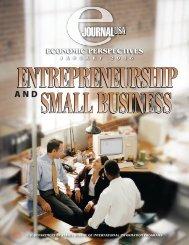s. history us history us history - Embassy of the United States
s. history us history us history - Embassy of the United States
s. history us history us history - Embassy of the United States
- No tags were found...
Create successful ePaper yourself
Turn your PDF publications into a flip-book with our unique Google optimized e-Paper software.
CHAPTER 9: DISCONTENT AND REFORMOUTLINE OF U.S. HISTORYinadequate for a 20th-century urbanstate. Years before, in 1873,<strong>the</strong> celebrated author Mark Twainhad exposed American society tocritical scrutiny in The Gilded Age.Now, trenchant articles dealing withtr<strong>us</strong>ts, high finance, impure foods,and ab<strong>us</strong>ive railroad practices beganto appear in <strong>the</strong> daily newspapersand in such popular magazines asMcClure’s and Collier’s. Their authors,such as <strong>the</strong> journalist Ida M.Tarbell, who cr<strong>us</strong>aded against <strong>the</strong>Standard Oil Tr<strong>us</strong>t, became knownas “muckrakers.”In his sensational novel, TheJungle, Upton Sinclair exposedunsanitary conditions in <strong>the</strong> greatChicago meat-packing ho<strong>us</strong>es andcondemned <strong>the</strong> grip <strong>of</strong> <strong>the</strong> beeftr<strong>us</strong>t on <strong>the</strong> nation’s meat supply.Theodore Dreiser, in his novelsThe Financier and The Titan madeit easy for laymen to understand<strong>the</strong> machinations <strong>of</strong> big b<strong>us</strong>iness.Frank Norris’s The Octop<strong>us</strong> assailedamoral railroad management; hisThe Pit depicted secret manipulationson <strong>the</strong> Chicago grain market.Lincoln Steffens’s The Shame <strong>of</strong> <strong>the</strong>Cities bared local political corruption.This “literature <strong>of</strong> exposure”ro<strong>us</strong>ed people to action.The hammering impact <strong>of</strong> uncompromisingwriters and an increasinglyaro<strong>us</strong>ed public spurredpolitical leaders to take practicalmeasures. Many states enacted lawsto improve <strong>the</strong> conditions underwhich people lived and worked. At<strong>the</strong> urging <strong>of</strong> such prominent socialcritics as Jane Addams, childlabor laws were streng<strong>the</strong>ned andnew ones adopted, raising age limits,shortening work hours, restrictingnight work, and requiring schoolattendance.ROOSEVELT’S REFORMSBy <strong>the</strong> early 20th century, most <strong>of</strong><strong>the</strong> larger cities and more than half<strong>the</strong> states had established an eighthourday on public works. Equallyimportant were <strong>the</strong> workman’scompensation laws, which madeemployers legally responsible forinjuries s<strong>us</strong>tained by employees atwork. New revenue laws were alsoenacted, which, by taxing inheritances,incomes, and <strong>the</strong> property orearnings <strong>of</strong> corporations, sought toplace <strong>the</strong> burden <strong>of</strong> government onthose best able to pay.It was clear to many people —notably President Theodore Rooseveltand Progressive leaders in <strong>the</strong>Congress (foremost among <strong>the</strong>mWisconsin Senator Robert LaFollette)— that most <strong>of</strong> <strong>the</strong> problemsreformers were concerned aboutcould be solved only if dealt with ona national scale. Roosevelt declaredhis determination to give all <strong>the</strong>American people a “Square Deal.”During his first term, he initiateda policy <strong>of</strong> increased government supervisionthrough <strong>the</strong> enforcement<strong>of</strong> antitr<strong>us</strong>t laws. With his backing,Congress passed <strong>the</strong> Elkins Act(1903), which greatly restricted <strong>the</strong>railroad practice <strong>of</strong> giving rebatesto favored shippers. The act madepublished rates <strong>the</strong> lawful standard,and shippers equally liable withrailroads for rebates. Meanwhile,Congress had created a new CabinetDepartment <strong>of</strong> Commerce andLabor, which included a Bureau <strong>of</strong>Corporations empowered to investigate<strong>the</strong> affairs <strong>of</strong> large b<strong>us</strong>inessaggregations.Roosevelt won acclaim as a“tr<strong>us</strong>t-b<strong>us</strong>ter,” but his actual attitudetoward big b<strong>us</strong>iness was complex.Economic concentration, hebelieved, was inevitable. Some tr<strong>us</strong>tswere “good,” some “bad.” The task<strong>of</strong> government was to make reasonabledistinctions. When, for example,<strong>the</strong> Bureau <strong>of</strong> Corporationsdiscovered in 1907 that <strong>the</strong> AmericanSugar Refining Company hadevaded import duties, subsequentlegal actions recovered more than$4 million and convicted severalcompany <strong>of</strong>ficials. The Standard OilCompany was indicted for receivingsecret rebates from <strong>the</strong> Chicago andAlton Railroad, convicted, and fineda staggering $29 million.Roosevelt’s striking personalityand his tr<strong>us</strong>t-b<strong>us</strong>ting activities captured<strong>the</strong> imagination <strong>of</strong> <strong>the</strong> ordinaryindividual; approval <strong>of</strong> his progressivemeasures cut across party lines.In addition, <strong>the</strong> abounding prosperity<strong>of</strong> <strong>the</strong> country at this time ledpeople to feel satisfied with <strong>the</strong> partyin <strong>of</strong>fice. He won an easy victory in<strong>the</strong> 1904 presidential election.Emboldened by a sweeping electoraltriumph, Roosevelt called forstronger railroad regulation. In June1906 Congress passed <strong>the</strong> HepburnAct. It gave <strong>the</strong> Interstate CommerceCommission real authority in regulatingrates, extended <strong>the</strong> commission’sjurisdiction, and forced <strong>the</strong>railroads to surrender <strong>the</strong>ir interlockinginterests in steamship linesand coal companies.O<strong>the</strong>r congressional measurescarried <strong>the</strong> principle <strong>of</strong> federal controlstill fur<strong>the</strong>r. The Pure Food andDrug Act <strong>of</strong> 1906 prohibited <strong>the</strong> <strong>us</strong>e<strong>of</strong> any “deleterio<strong>us</strong> drug, chemical,or preservative” in prepared medicinesand foods. The Meat InspectionAct <strong>of</strong> <strong>the</strong> same year mandatedfederal inspection <strong>of</strong> all meat-packingestablishments engaged in interstatecommerce.Conservation <strong>of</strong> <strong>the</strong> nation’snatural resources, managed development<strong>of</strong> <strong>the</strong> public domain, and<strong>the</strong> reclamation <strong>of</strong> wide stretches <strong>of</strong>neglected land were among <strong>the</strong> o<strong>the</strong>rmajor achievements <strong>of</strong> <strong>the</strong> Rooseveltera. Roosevelt and his aides weremore than conservationists, but given<strong>the</strong> helter-skelter exploitation <strong>of</strong>public resources that had preceded<strong>the</strong>m, conservation loomed large on<strong>the</strong>ir agenda. Whereas his predecessorshad set aside 18,800,000 hectares<strong>of</strong> timberland for preservationand parks, Roosevelt increased <strong>the</strong>area to 59,200,000 hectares. Theyalso began systematic efforts to preventforest fires and to re-timberdenuded tracts.TAFT AND WILSONRoosevelt’s popularity was at itspeak as <strong>the</strong> campaign <strong>of</strong> 1908 neared,but he was unwilling to break <strong>the</strong>196197












